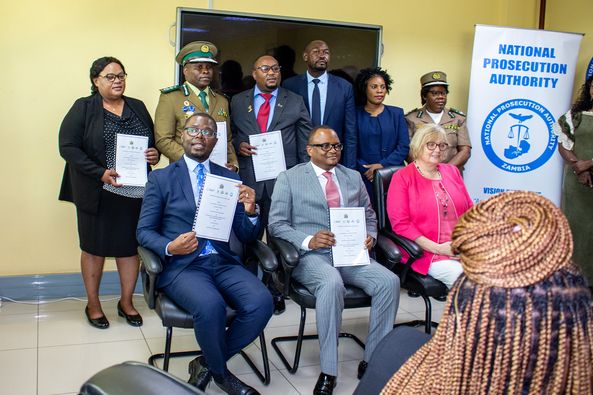Mobile Courts Model Launched to Address Prison Overcrowding in Zambia
Zambia’s National Prosecution Authority (NPA), in collaboration with the Irish Rule of Law International and key stakeholders such as the Judiciary, the Legal Aid Board, and the Zambia Correctional Service, has introduced the Mobile Courts Model to alleviate congestion in correctional facilities.
The initiative, supported by the Irish Rules of Law, aims to conduct court sessions within prison premises, marking a significant step forward in addressing the pervasive issue of prison overcrowding in the Republic of Zambia.
The Memorandum of Understanding for the establishment of Mobile Courts was signed, with the Director of Anti-Money Laundering Investigation Unit representing the Drug Enforcement Commission Director General.
Director of Public Prosecutions Gilbert Phiri highlighted the importance of this innovative approach, stating that the NPA recognizes the detrimental impact of prison overcrowding on Zambia’s justice system.
He emphasized that congestion within correctional facilities not only hampers the swift administration of justice but also compromises the living conditions of individuals awaiting trial.
“The gravity of the problem demands collective action and collaboration to make a substantial impact. Hence, the Mobile Courts initiative is a strategic intervention designed to expedite legal proceedings,” Mr. Phiri explained.
The Mobile Courts Model is expected to fast-track court cases, particularly those related to the Drug Enforcement Commission, and enhance the overall legal framework in Zambia.
By bringing court proceedings directly to correctional facilities, the initiative aims to promptly address issues such as bail applications, varying conditions for bail, and setting hearing dates.
“Having courts move to the correctional facilities and conducting hearings therein allows straightforward issues to be heard promptly, thereby having a tremendous impact on preventing unnecessary over-detention,” added Mr. Phiri.
This innovative approach not only ensures timely justice but also provides a crucial response to prison overcrowding by bringing justice closer to inmates.
The model is particularly beneficial for individuals in need who may not have easy access to legal representation, promoting fairness and efficiency within Zambia’s legal system.



